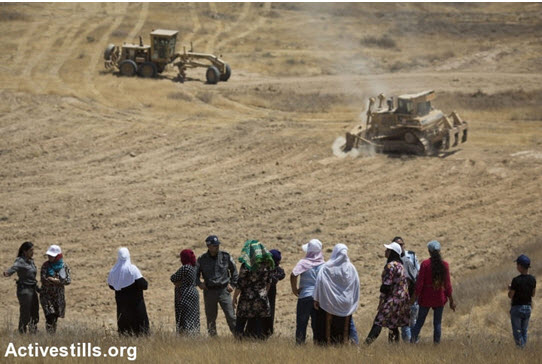To discuss his plans for how Israeli society can better relate to its Arab minority citizens, Joint List chairman, MK Ayman Odeh (Hadash), recently granted an exclusive interview to The Jerusalem Post. The interview was published on Sunday, July 31, just one day after scores of activists commemorated six years to the destruction of the unrecognized Bedouin village of Al-Araqib in the Negev. In the six years that have elapsed since the village’s initial demolition (July 27, 2010), the residents of Al-Araqib have been forced to rebuild their village 100 times, as the Jewish National Fund (JNF) has repeatedly sent back its bulldozers that many time, always secured by heavily armed police, to undo the residents’ unyielding resistance to their dispossession. Because of the ongoing cycle of demolition, rebuilding, and demolition yet again, Al-Araqib has become an heroic symbol for the Palestinian Arab community in Israel in its struggle for equality in the eyes of the State.

Arab-Bedouin women, supervised by Israeli police officers, can only helplessly look on as bulldozers of the Jewish National Fund (JNF) plow up private lands belonging to the unrecognized village of Al-Araqib, in preparation for the planting of a JNF forest, July 20, 2016. During the last six years, Al-Araqib has been demolished more than one hundred times. (Photo: Activestills)
In his interview with the Post, MK Odeh noted how since 1948 the state has built 700 new towns and villages for Jewish residents, but the only ones built for Arabs are seven townships constructed for Arab Bedouin in the Negev. But even these were built only to forcibly urbanize and proletarianize the Bedouin (Rahat, the largest, has 90,000 residents), uprooting them from their traditional semi-nomadic lifestyle based on grazing and subsistence agriculture, and forcing them to vacate the lands where they previously resided and made their livelihoods. But without adequate employment opportunities, these townships are rife with unemployment (Rahat, for example, topped the national statistics for joblessness with 37.2% in 2010), and as a result chronic poverty, despair, high levels of crime and use of drugs are endemic. Odeh noted that, other than these seven Negev townships, no new towns have been established for Arabs anywhere else in the country. He then asked rhetorically if, since 1948, the state has built some 300 new Jewish communities in the Negev, why haven’t 60 (not 7) been built for Arabs, as Arabs constitute 20% of Israel’s population?
The full Jerusalem Post interview with MK Aiman Odeh: http://www.jpost.com/Magazine/Putting-it-all-on-the-table-459759
Related: Police Arrest Nine during a Protest in “Unrecognized” Bedouin Village


